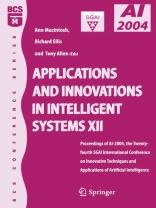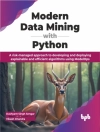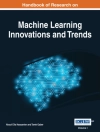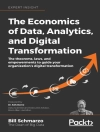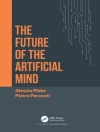A. L. Macintosh, Napier University, UK The papers in this volume are the refereed application papers presented at ES2004, the Twenty-fourth SGAI International Conference on Innovative Techniques and Applications of Artificial Intelligence, held in Cambridge in December 2004. The conference was organised by SGAI, the British Computer Society Specialist Group on Artificial Intelligence. This volume contains twenty refereed papers which present the innovative application of a range of AI techniques in a number of subject domains. This year, the papers are divided into sections on Synthesis and Prediction, Scheduling and Search, Diagnosis and Monitoring, Classification and Design, and Analysis and Evaluation This year’s prize for the best refereed application paper, which is being sponsored by the Department of Trade and Industry, was won by a paper entitled ’A Case-Based Technique for Tracking Concept Drift in Spam Filtering’. The authors are Sarah Jane Delany, from the Dublin Institute of Technology, Ireland, and Padraig Cunningham, Alexey Tsymbal, and Lorcan Coyle from Trinity College Dublin, Ireland. This is the twelfth volume in the Applications and Innovations series. The Technical Stream papers are published as a companion volume under the title Research and Development in Intelligent Systems XXI. On behalf of the conference organising committee I should like to thank all those who contributed to the organisation of this year’s application programme, in particular the programme committee members, the executive programme committee and our administrators Linsay Turbert and Collette Jackson.
Innehållsförteckning
Best Application Paper.- A Case-Based Technique for Tracking Concept Drift in Spam Filtering.- Synthesis and Prediction.- Matching and Predicting Crimes.- Story Plot Generation based on CBR.- Studying Continuous Improvement from a Knowledge Perspective.- Re TAX+: A Cooperative Taxonomy Revision Tool.- Scheduling and Search.- A Non-Binary Constraint Ordering Approach to Scheduling Problems.- A Heuristic Based System for Generation of Shifts with Breaks.- A Topological Model Based on Railway Capacity to Manage Periodic Train Scheduling.- Collaborative Search: Deployment Experiences.- Diagnosis and Monitoring.- A Model-Based Approach to Robot Fault Diagnosis.- Automating the Analysis and Management of Power System Data using Multi-agent Systems Technology.- The Industrialisation of a Multi-Agent System for Power Transformer Condition Monitoring.- Classification and Design.- An Improved Genetic Programming Technique for the Classification of Raman Spectra.- PROPOSE – Intelligent Advisory System for supporting Redesign.- The Designers’ Workbench: Using Ontologies and Constraints for Configuration.- A Visualisation Tool to Explain Case-Base Reasoning Solutions for Tablet Formulation.- Analysis and Evaluation.- Formal Analysis of Empirical Traces in Incident Management.- Modelling Expertise for Structure Elucidation in Organic Chemistry Using Bayesian Networks.- Evaluation of a Mixed-Initiative Dialogue Multimodal Interface.
